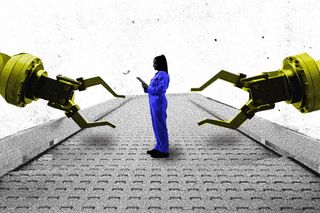
Sharing Workplaces With Robots Leads to More Insecurity, Less Productivity in People: Study
“On the one hand, robots can obviously enhance human employees’ performance because they enhance efficiency. On the other hand, however, our stress account suggests that this increased efficiency might be offset by...

The man v/s machine trope has been an eternal feature of post-Industrial society. From the legend of John Henry who gave his life in a duel against a steam drill to multiple films and novels set in dystopian futures led by machines where humans are enslaved, all highlight the insecurity of humans losing out to machines much smarter and more efficient than us. New research published this week in the Journal of Applied Psychology brings to the fore this fear among industrial workers who share their workspaces with robots.
The study comes at a time when the manufacturing of robots has shot through the roof, with several countries eyeing to aim automation in the recent past. According to data released by the International Federation of Robotics (IFR), more than three million industrial robots were operating around the world in 2020, with the use of industrial robots nearly doubling from 66 robots per 10,000 humans in 2015 to 126 robots per 10,000 humans in 2020.
“…pundits often warn about how robots might replace humans at work and create mass unemployment. Despite these warnings, relatively little research has directly assessed how laypeople react to robots in the workplace,” the researchers write in their study. In a press release, Dr. Kai Chi Yam, co-author of the research, further explains the rationale behind looking at factory workers’ attitudes toward robots. He says, “some economists theorize that robots are more likely to take over blue-collar jobs faster than white-collar jobs.”
For the study, the researchers chose to base their research on four countries: India, Singapore, Taiwan, and the United States of America. They looked at relationships with industrial robots that factory workers shared in these countries. Over multiple interviews, surveys, and behavioral experiments, they asked the workers and their parents about their perceptions of robots and their feelings about sharing workspaces with them. Alongside these experiments, they also analyzed existing data about how many factories and industrial workspaces made use of robots, and how they impacted the work output in those spaces.
Further, through their behavioral experiments and interviews, the scientists observed that in workers, there was a feeling of deep insecurity and fear about robots taking over their jobs.
In one of their chosen sites — an automobile manufacturing factory in India — working with industrial robots was associated with increased workplace burnout, declining productivity by the workers, and higher workplace incivility. A 2019 IFR report identified India’s automotive sector as the biggest customer of industrial robots, accounting for more than 60% of the world’s supply, noting that “on average, each newly installed robot displaces 1.6 manufacturing workers.” And as robots proliferate in Indian factories, many companies are moving toward achieving “lights-out” production units — factories that can operate without any human presence or intervention altogether.
On collating data from all their experiments and analyses, the scientists expressed that while the role of robots in increasing job insecurity could not be ignored, media perception and reporting about robots largely overplayed their dangers. “Most people are overestimating the capabilities of robots and underestimating their own capabilities,” Yam said in the press release. “Media reports on new technologies like robots and algorithms tend to be apocalyptic in nature, so people may develop an irrational fear about them,” he added.
Related on The Swaddle:
The World Is Turning to AI Weapons to Reduce War Casualties. What Could Possibly Go Wrong?
Concerns about human job loss due to robots aren’t unfounded: an analysis by Oxford Economics estimates that 20 million humans working in the manufacturing sector alone by 2030. Some of the jobs in the service sector, such as jobs in transport, construction, delivery, etc are also susceptible to automation, the report adds. However, at the same time, it also speculates that increased automation will lead to an expanding economy, which in turn can lead to more jobs. As The Economist also notes in a recent report, “automation might help a firm become more profitable and thus expand, leading to a hiring spree. Technology might also allow firms to move into new areas, or to focus on products and services that are more labour-intensive.” Studies from Finland and Japan have also shown that the introduction of a few robots in the workplace indeed boosted the employees’ work output.
The debate over robots taking over jobs is also more nuanced in the Indian context. Some jobs, like manual scavenging and sewer cleaning, are rooted in caste oppression and inequality. Since 1993, the year when India enacted a law abolishing manual scavenging, 971 people have died cleaning sewers and septic tanks. The number hints at the unsafe working conditions and the dangerous health risks associated with the work itself.
“No civilized society should allow such a practice. Fifth and sixth generations of Dalit families are still employed in the profession — a perfect example of how caste continues to perpetuate discrimination and ostracization in India. Technology has to become the alternative,” Shaileshkumar Darokar, a sociologist from TISS, Mumbai, told Undark.
Robots and machinery, then, are looked upon as a potential alternative to end the necessity of humans having to perform these jobs. A group of engineers in Kerala built a robot called Bandicoot that successfully completed a trial run in 2018; another team at the Indian Institute of Technology, Madras developed a robot that could perform manual scavenging work entirely on its own.
Still, activists point out that tech-based solutions aren’t enough: rehabilitation and proper alternatives to the job are necessary so as to not leave former manual-scavengers destitute.
“On the one hand, robots can obviously enhance human employees’ performance because they enhance efficiency. On the other hand, however, our stress account suggests that this increased efficiency might be offset by increased job insecurity,” the scientists mention in the current study, adding, “No one knows with certainty how robots will shape our future society, and that uncertainty itself can be unnerving.”
Job losses have been a part of every transitionary phase in history. However, as employers and states now become aware of the large fallout of these losses on the economy and, more importantly, on employees’ own health, it becomes their responsibility to ensure that workers have enough skills and resources which can help them adapt to changing times without hassle.
Amlan Sarkar is a staff writer at TheSwaddle. He writes about the intersection between pop culture and politics. You can reach him on Instagram @amlansarkr.
Related


Using Self‑Deprecating Humor May Be a Sign of Poor Body Image, Suggests Study
